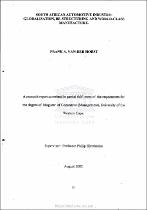South African automotive industry: globalisation, re-structuring and world-class manufacture.
Abstract
Political and economic sanctions between 1970 and 1994 isolated the inward-oriented economy of South Africa from global trends. A variety of factors, such as a challenging new global competitive environment, production overcapacity, falling protectionist tariff barriers in a period of liberalisation, world-class manufacture and globalisation, are contributing to the reform of the economy and the automotive industry. The South African automotive industry therefore faces a major reform in trade policy. The South African government introduced the Motor Industry Development Plan (MIDP) in 1995, to create the necessary levels of competitiveness, promote world class manufacture practices, increase levels of investments and exports that would consequently lead to the successful reconstruction and development of this sector of
the South African economy. Subsequent research has shown that the successful adoption of world-class manufacture (or lean production) processes in the South African automotive industry is necessary not only for survival, but also for increased competitiveness of the
industry and the improved economic performance of automotive firms. However, complicated links exist between the adoption of world-class manufacture for improved levels of operational competitiveness. for firm-level success, on the one hand, and long-term sustainability of the industry, on the other hand. Combined firm level economic success and long-term sustainability of the industry depend on factors
such as international trends, connectivity to global value chains, modern technological capabilities, lean production and enterprise systems, substantial investments, increased exports, world-wide quality standards, as well as customer satisfaction, human resource development, advanced education, skills development, worker participation, government policy and institutional support. This is borne out by a recent study of the auto component sector, utilising a lean , production 'market driver' toolkit. The study found that although component
manufacturers significantly improved their operational competitiveness, they have not necessarily experienced improved economic performance levels. More important is connectedness and integration into global value chains, via intermediaries, mergers and acquisitions. The changing political economy of automotive value chains is also important in shaping fum-level operational success and industry sustainability. In this research paper, we review global automotive industry trends which influenced the introduction of the government's visionary MIDP. We then discuss their impact on the performance of the South African assembly and component sectors at industry
and finn level. This leads to a series of recommendations for improved performance to world-class manufacture, world-wide quality standards and global competitiveness

